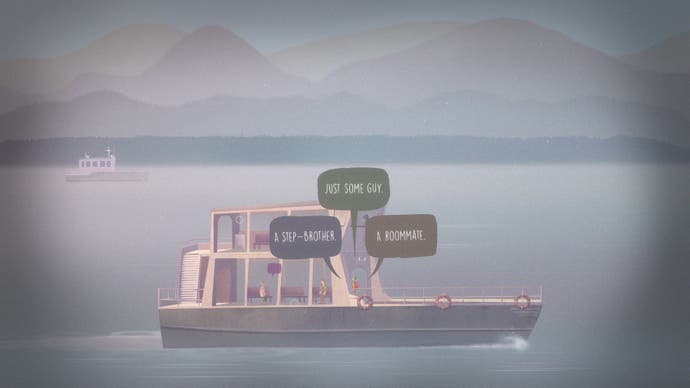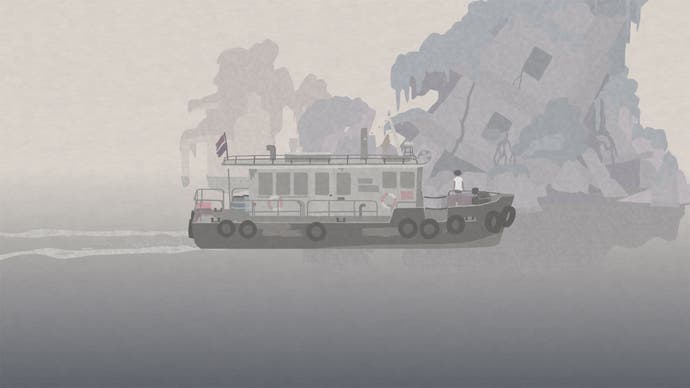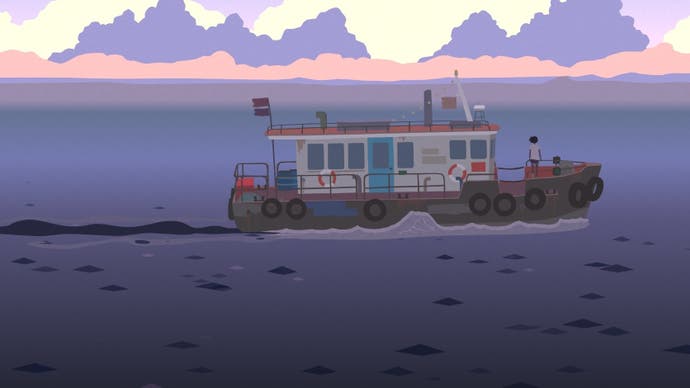Just a ride: how boat trips give games narrative breathing space
Ferry well.
I was recently asked to write a political piece. It was almost a rant, particularly as my exhaustion was similar to how I felt in late 2015. When a certain party leader was about to be elected here in the UK, and my family's security was under 'threat', working at a political magazine in London made me feel weary. I touted my "I'm a tourist" line to colleagues and decided to ascend in a London Eye pod (iPod?) that weekend. However, the ferry ride afterwards proved to be the respite I was really looking for.
It was reasonably sunny, and, unsurprisingly, most of the passengers were foreign visitors. Besides absorbing the occasional fact and factoid from the overly-energetic tour guide through their microphone, I was primarily focussed on drowning out the noise with the help of Jack Johnson and other mellow tones. (I blame this on having to babysit my nephew several months earlier, who was very into the Curious George film.) I wouldn't say I was lonely at the time, as I ended up making friends in the following weeks and months, but I was glad to have had a natural moment of reflection that wasn't entirely self-absorbed.
In recent years, I've noticed that many games include sequences on boats to provide similarly quiet, thoughtful moments for their stories and characters. The lamest has to be Alan Wake, as there are only a few lines of dialogue, mostly ignoring the eponymous character being a tormented writer suffering from writer's block. The opening ride in What Remains of Edith Finch, on the other hand, plays a wonderful trick by using a journal to dive straight into the beautiful and mysterious story of the Finch family.
One standout game that avoids any moment of subtlety or atmospheric calm is Oxenfree. As Alex, you head to the fictional Edwards Island with a friend and your new step-brother, eventually finding yourself in the middle of a supernatural adventure. On the ferry ride there, you barely get a chance to think for yourself, as you find yourself asking questions and being dragged into others' conversations. It's a brilliant game because the world and its characters keep existing even if you stand still for a moment. It made me realise how little we actually think when conversing with others sometimes, our spontaneous utterances unable to be willingly delayed like text messages and emails.
Although Kentucky Route Zero doesn't really have characters and dialogue that'll happily ignore you like in Oxenfree, there is a sequence in act four that almost peels back the outside of the boat, letting you read the conversations taking place between the different characters. And even though they all hop on and off during this chunk of the game, much of the dialogue doesn't ever directly address what's happening aboard.

This contrasts massively with what Kai experiences at the start of Mutazione. After hugging her mother goodbye, she looks over the letter that catalyses her journey to the strange, mutant community where her estranged grandfather lives, hoping to reconcile and hear some wise words before he passes away. After some sarcastic back-and-forth with the captain, she lives through the first of many unusual, incoherent dreams she'll end up experiencing, offering potential foresight about the mysteries of the island she's visiting. Ironically, this ends up making the boat the last stop of normality, a haven before arriving into a wildly unknown world.
The one game that truly embraces the no man's land (at sea, yes) status of a safe, contemplative boat ride is Tell Me Why. Siblings Tyler and Alyson, who had shortly reunited beforehand, use their time on the ferry to talk a little about the past, share what they each want to do in life, and observe the surrounding environment.

I've been passively rewatching old episodes of Grey's Anatomy in recent weeks, realising I'm a little bit like Derek Shepherd thanks to his love for ferry boats. Of course, I must declare I'm unsure of ever having had the mental capacity to become a neurosurgeon, as much as I wanted to be a doctor at one point, because being a writer usually means mentally fretting about which words to use and where, a far less productive role in society than repairing people's brains. And although I haven't kept up with the show in recent years, I'm amused how it's been playing on screens since I was barely a teenager, a strange and much-needed constant in our world today.
Looking back now, those few weekend boat rides on the Thames were such a relief and provided so much calm. It was probably because I was scared, unsure where my life was headed like the characters in Tell Me Why, or Kai in Mutazione, too focussed on trying to impress others in my first writing job. But really, I'm still unsure where I'm headed at times. I think this nostalgia would perhaps hinder the usefulness of a ferry ride today, but I'm still seeking a way to take a breather from everything around me. Sometimes games alone aren't the answer, but they do end up reminding us of what and who we value most in life, however precarious and unexpected our journeys become.










